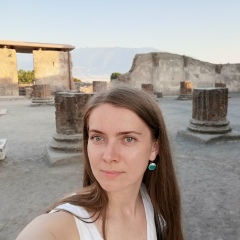Родительство
В нашей культуре есть такая форма жертвенности, когда родитель или родители кладут свою жизнь на «алтарь» ребенка. «Я ему всё дам, чего сам не имел». «Мой ребенок не будет ни в чем нуждаться». «Мне в детстве так не хватало..., у моих детей это обязательно будет». Стоит ли говорить, что речь идет не об удовлетворении потребностей детей, а о своеобразном залечивании раны самого родителя.
«Хочу, чтоб мой ребенок был умным, успешным, целеустремленным, счастливым и так далее, а я всё для этого сделаю!» «Буду посвящать ему всё свое время». Или другая крайность, «буду много работать, зарабатывать и отдавать ему всё, обеспечу деньгами». «Откажусь ради него от личной жизни и отношений». «Нет на себя мне ни времени, ничего другого не надо, я уже свое пожила, проживу как-нибудь и дальше...»
Нужна ли эта жертва ребенку?
Уже не говоря о том, что дальше это может обернуться «неоплатным долгом» перед родителями, «жизнь за жизнь», «я тебе свою отдал, а теперь ты мне». И уже выросший ребенок чувствует необходимость расплатиться...
Ребенку нужен счастливый вы, ролевая модель адекватного взрослого человека.
Ребенок хочет вашего положительного внимания и это для него самое ценное, а вовсе не деньги, дорогие игрушки, гаджеты и т.п. Какая польза от игры, если родителя нет рядом? Или тень человека вместо родителя. Вся жизнь в ребенке, а родитель - бесплатное приложение.
Родительству, как правило, не учат. Точнее учат, в родительской семье. Если вы выросли в несчастливой семье, то можете стать первым, кто положит начало счастью)
«Дети являются отражением родителей. Дайте им (детям) такое лицо, чтобы было, что отражать» М.Аткинсон.
Станьте счастливыми, и ваши дети будут счастливы, взяв с вас пример.
Пост 26 для проекта [club75479771|Я блоггер. Хочешь писать? Участвуй!]
#я_блоггер #верьсебе
В нашей культуре есть такая форма жертвенности, когда родитель или родители кладут свою жизнь на «алтарь» ребенка. «Я ему всё дам, чего сам не имел». «Мой ребенок не будет ни в чем нуждаться». «Мне в детстве так не хватало..., у моих детей это обязательно будет». Стоит ли говорить, что речь идет не об удовлетворении потребностей детей, а о своеобразном залечивании раны самого родителя.
«Хочу, чтоб мой ребенок был умным, успешным, целеустремленным, счастливым и так далее, а я всё для этого сделаю!» «Буду посвящать ему всё свое время». Или другая крайность, «буду много работать, зарабатывать и отдавать ему всё, обеспечу деньгами». «Откажусь ради него от личной жизни и отношений». «Нет на себя мне ни времени, ничего другого не надо, я уже свое пожила, проживу как-нибудь и дальше...»
Нужна ли эта жертва ребенку?
Уже не говоря о том, что дальше это может обернуться «неоплатным долгом» перед родителями, «жизнь за жизнь», «я тебе свою отдал, а теперь ты мне». И уже выросший ребенок чувствует необходимость расплатиться...
Ребенку нужен счастливый вы, ролевая модель адекватного взрослого человека.
Ребенок хочет вашего положительного внимания и это для него самое ценное, а вовсе не деньги, дорогие игрушки, гаджеты и т.п. Какая польза от игры, если родителя нет рядом? Или тень человека вместо родителя. Вся жизнь в ребенке, а родитель - бесплатное приложение.
Родительству, как правило, не учат. Точнее учат, в родительской семье. Если вы выросли в несчастливой семье, то можете стать первым, кто положит начало счастью)
«Дети являются отражением родителей. Дайте им (детям) такое лицо, чтобы было, что отражать» М.Аткинсон.
Станьте счастливыми, и ваши дети будут счастливы, взяв с вас пример.
Пост 26 для проекта [club75479771|Я блоггер. Хочешь писать? Участвуй!]
#я_блоггер #верьсебе
Parenthood
In our culture, there is such a form of sacrifice when a parent or parents lay their lives on the "altar" of the child. "I will give him everything that I myself did not have." "My child will not need anything." “I was so lacking in childhood ... my children will definitely have this.” Needless to say, this is not about satisfying the needs of children, but about the peculiar healing of the wounds of the parent himself.
“I want my child to be smart, successful, purposeful, happy and so on, but I will do everything for this!” “I will devote all my time to him.” Or the other extreme, "I will work hard, earn and give everything to him, I will provide money." “I will give up my personal life and relationships for him.” “I don’t have time for myself, I don’t need anything else, I’ve already lived my own, I’ll live somehow further ...”
Does the child need this sacrifice?
Not to mention the fact that further this may turn into an “unpaid debt” to parents, “life for life”, “I gave you mine, and now you give me”. And an already grown child feels the need to pay ...
The child needs a happy you, the role model of an adequate adult.
The child wants your positive attention and this is the most valuable thing for him, and not money, expensive toys, gadgets, etc. What is the use of the game if the parent is not nearby? Or the shadow of a person instead of a parent. All life is in the child, and the parent is a free application.
Parenthood, as a rule, is not taught. More precisely, they are taught in a parental family. If you grew up in an unhappy family, you can be the first to initiate happiness)
“Children are a reflection of parents. Give them (the children) a face so that there is something to reflect. ”M. Atkinson.
Be happy, and your children will be happy, taking an example from you.
Post 26 for the project [club75479771 | I am a blogger. Do you want to write? Take part!]
#i_blogger # believe yourself
In our culture, there is such a form of sacrifice when a parent or parents lay their lives on the "altar" of the child. "I will give him everything that I myself did not have." "My child will not need anything." “I was so lacking in childhood ... my children will definitely have this.” Needless to say, this is not about satisfying the needs of children, but about the peculiar healing of the wounds of the parent himself.
“I want my child to be smart, successful, purposeful, happy and so on, but I will do everything for this!” “I will devote all my time to him.” Or the other extreme, "I will work hard, earn and give everything to him, I will provide money." “I will give up my personal life and relationships for him.” “I don’t have time for myself, I don’t need anything else, I’ve already lived my own, I’ll live somehow further ...”
Does the child need this sacrifice?
Not to mention the fact that further this may turn into an “unpaid debt” to parents, “life for life”, “I gave you mine, and now you give me”. And an already grown child feels the need to pay ...
The child needs a happy you, the role model of an adequate adult.
The child wants your positive attention and this is the most valuable thing for him, and not money, expensive toys, gadgets, etc. What is the use of the game if the parent is not nearby? Or the shadow of a person instead of a parent. All life is in the child, and the parent is a free application.
Parenthood, as a rule, is not taught. More precisely, they are taught in a parental family. If you grew up in an unhappy family, you can be the first to initiate happiness)
“Children are a reflection of parents. Give them (the children) a face so that there is something to reflect. ”M. Atkinson.
Be happy, and your children will be happy, taking an example from you.
Post 26 for the project [club75479771 | I am a blogger. Do you want to write? Take part!]
#i_blogger # believe yourself

У записи 9 лайков,
1 репостов,
479 просмотров.
1 репостов,
479 просмотров.
Эту запись оставил(а) на своей стене Евгения Володинен























![Стас Однолетков -=[strast]=- Стас Однолетков -=[strast]=-](https://sun9-50.vkuserphoto.ru/s/v1/ig2/BQKIUfD3kthNCNNY9BS69xiPt_GjwVRhAU8D64L6gfeFjcmrTqYrLAC9NKgCppVxwhm79Mi5RypIHhjSHOhQK2uy.jpg?quality=95&crop=347,544,400,400&as=32x32,48x48,72x72,108x108,160x160,240x240,360x360&ava=1&cs=200x200)





